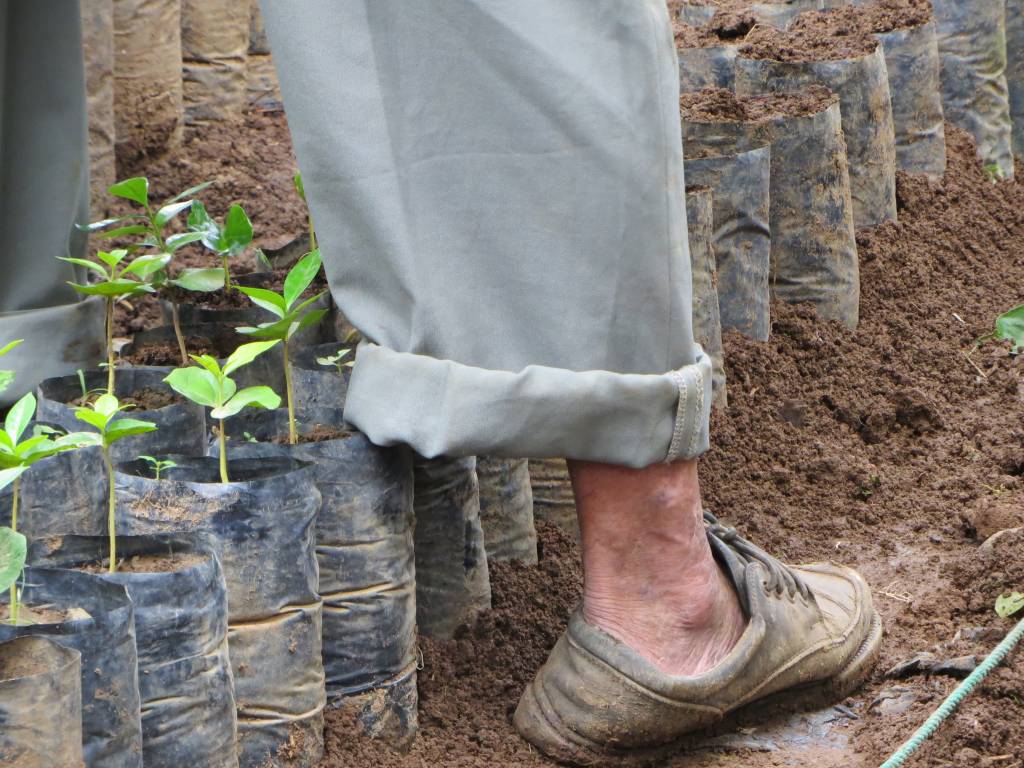The Presbyterian Hunger Program proudly partners with Equal Exchange through our Presbyterian Coffee Project. Read the original version of this post on the Equal Exchange blog here.
November 16th marked the 29th anniversary of the slaying of six Jesuit priests, their housekeeper and her daughter by government-run death squads in El Salvador in 1989. This past October 14th, slain Salvadoran archbishop Oscar Romero was canonized as a saint by the Catholic Church. The murders of these priests—and of 80,000 more whose names we’ll never know—were carried out in no small part with the support of billions of dollars in U.S. funding and training of corrupt governments in El Salvador. The victims were largely peasants and workers organizing for their rights and a better life.

Is it any wonder that so many have sought refuge and stability in the north?
A brief internet search will bring up disturbing examples of our government’s role in violence in the region dating back nearly 100 years.
- Nicaragua: For over forty years, beginning in 1936, the United States supported the corrupt dictatorships of the Somoza family who used the military to protect their vast private holdings and jail and kill those who opposed the regime.
- Guatemala: In 1954, the CIA—in close contact with the United Fruit Company (i.e., Chiquita banana)—overthrew democratically elected president, Jacobo Arbenz. This triggered decades of mass killing, primarily of indigenous Guatemalans, the staggering toll of which remains very present today.
- Honduras: As recently as 2009, the United States recognized the coup which overthrew democratically elected president Mel Zelaya. Our country then recognized his re-election amidst evidence of massive fraud last November. These events have triggered assassinations by death squads acting with impunity of hundreds of activists including the internationally recognized indigenous leader and grassroots environmentalist activist Berta Caceres.
Besides our fundamental support for human rights and economic justice, why is Equal Exchange dedicating space to this topic? It is because many of the small farmers we work with in all these countries are victims of our government’s policies.
The mission of Equal Exchange is to build viable, sustainable markets for small farmers in a system stacked in favor of big players. More broadly, we are trying to inject equity into a food system overwhelmingly controlled by large corporations. Fair trade as we live it is both a philosophy and a practice. It is also a direct challenge to the worst impacts of unmitigated free trade.
One such consequence of the North America Free Trade Agreement (NAFTA) of 1994 was the massive inflow of subsidized industrially-produced corn from the U.S. to Mexico. The tragic result was the depression in prices for this nearly religious staple, maiz, such that hundreds of thousands of smallholder corn farmers lost their land and saw no alternative for economic survival but migrating north in search of a better life.
Finally, as we seek to honestly account for the role the United States has played in provoking emigration from Central America and Mexico, we have to recognize the devastating impact of climate change. While our country has historically been by far the largest contributor to the warming of the planet, we have only recently experienced its devastating impact as manifested by extreme weather events. But for many years, small farming communities around the world—communities that have contributed little to the problem—have lived at the mercy of increasingly frequent, unnatural weather extremes. Many of our partners, from cacao producers in Peru to coffee growers in southern Mexico to rooibos farmers in South Africa and cashew growers in El Salvador, have confronted weather patterns and events that add exponentially to the challenges of survival on the land. The extremes of droughts and floods, together with the no longer dependable seasonal patterns of rain and sun, have forced thousands of farmers to abandon their land and seek economic alternatives elsewhere. Again, that “elsewhere” has often meant leaving family and everything familiar behind in favor of the dangerous journey and uncertainty wrapped in the hope of better opportunities in the United States and other countries.
As we at Equal Exchange do our best every day to help improve the livelihoods of small farmers and make that work viable over the long run, it is our duty to speak our truth as we see it in response to the many crises in the world today, especially those that touch our coop and our partners directly. The demonization of desperate immigrants and the ignoring of our own government’s role in the tragedy are among those issues we will not stay silent on.
The Presbyterian Hunger Program is a proud partner of Blessed Tomorrow, a coalition of faith leaders committed to serve as faithful stewards of creation. Founded by ecoAmerica, Blessed Tomorrow offers tools, resources, and communications to demonstrate visible climate leadership, inspiring and empowering faith leaders to speak about, act on and advocate for climate solutions.